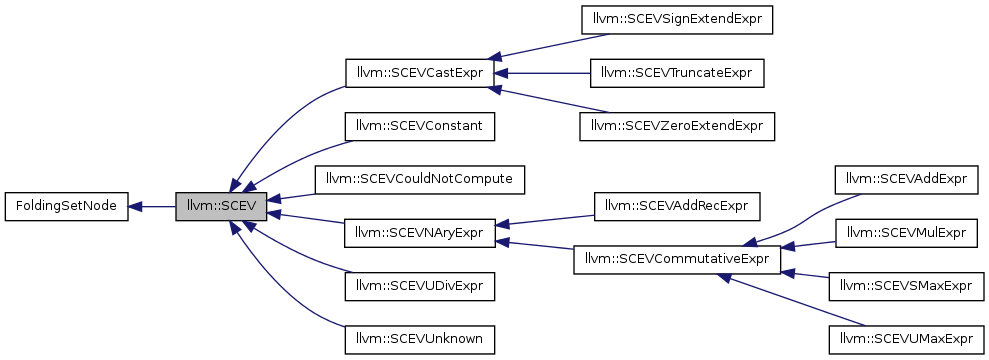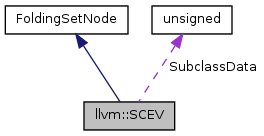#include <ScalarEvolution.h>


Public Types | |
| enum | NoWrapFlags { FlagAnyWrap = 0, FlagNW = (1 << 0), FlagNUW = (1 << 1), FlagNSW = (1 << 2), NoWrapMask = (1 << 3) -1 } |
Public Member Functions | |
| SCEV (const FoldingSetNodeIDRef ID, unsigned SCEVTy) | |
| unsigned | getSCEVType () const |
| Type * | getType () const |
| bool | isZero () const |
| bool | isOne () const |
| bool | isAllOnesValue () const |
| bool | isNonConstantNegative () const |
| void | print (raw_ostream &OS) const |
| void | dump () const |
Protected Attributes | |
| unsigned short | SubclassData |
Friends | |
| struct | FoldingSetTrait< SCEV > |
Detailed Description
SCEV - This class represents an analyzed expression in the program. These are opaque objects that the client is not allowed to do much with directly.
Definition at line 58 of file ScalarEvolution.h.
Member Enumeration Documentation
NoWrapFlags are bitfield indices into SubclassData.
Add and Mul expressions may have no-unsigned-wrap <NUW> or no-signed-wrap <NSW> properties, which are derived from the IR operator. NSW is a misnomer that we use to mean no signed overflow or underflow.
AddRec expression may have a no-self-wraparound <NW> property if the result can never reach the start value. This property is independent of the actual start value and step direction. Self-wraparound is defined purely in terms of the recurrence's loop, step size, and bitwidth. Formally, a recurrence with no self-wraparound satisfies: abs(step) * max-iteration(loop) <= unsigned-max(bitwidth).
Note that NUW and NSW are also valid properties of a recurrence, and either implies NW. For convenience, NW will be set for a recurrence whenever either NUW or NSW are set.
Definition at line 95 of file ScalarEvolution.h.
Constructor & Destructor Documentation
| llvm::SCEV::SCEV | ( | const FoldingSetNodeIDRef | ID, |
| unsigned | SCEVTy | ||
| ) | [inline, explicit] |
Definition at line 101 of file ScalarEvolution.h.
Member Function Documentation
| void SCEV::dump | ( | ) | const |
dump - This method is used for debugging.
Definition at line 134 of file ScalarEvolution.cpp.
References llvm::dbgs(), and print().
| unsigned llvm::SCEV::getSCEVType | ( | ) | const [inline] |
Definition at line 104 of file ScalarEvolution.h.
Referenced by BuildConstantFromSCEV(), llvm::SCEVConstant::classof(), llvm::SCEVCastExpr::classof(), llvm::SCEVTruncateExpr::classof(), llvm::SCEVZeroExtendExpr::classof(), llvm::SCEVSignExtendExpr::classof(), llvm::SCEVCouldNotCompute::classof(), llvm::SCEVNAryExpr::classof(), llvm::SCEVCommutativeExpr::classof(), llvm::SCEVAddExpr::classof(), llvm::SCEVMulExpr::classof(), llvm::SCEVUDivExpr::classof(), llvm::SCEVAddRecExpr::classof(), llvm::SCEVSMaxExpr::classof(), llvm::SCEVUMaxExpr::classof(), llvm::SCEVUnknown::classof(), getExprBase(), getType(), GroupByComplexity(), isHighCostExpansion(), print(), llvm::SCEVVisitor< SCEVExpander, Value * >::visit(), and llvm::SCEVTraversal< SV >::visitAll().
| Type * SCEV::getType | ( | ) | const |
getType - Return the LLVM type of this SCEV expression.
Reimplemented in llvm::SCEVUnknown, llvm::SCEVUDivExpr, llvm::SCEVAddExpr, llvm::SCEVNAryExpr, llvm::SCEVCastExpr, and llvm::SCEVConstant.
Definition at line 250 of file ScalarEvolution.cpp.
References getSCEVType(), llvm_unreachable, llvm::scAddExpr, llvm::scAddRecExpr, llvm::scConstant, llvm::scCouldNotCompute, llvm::scMulExpr, llvm::scSignExtend, llvm::scSMaxExpr, llvm::scTruncate, llvm::scUDivExpr, llvm::scUMaxExpr, llvm::scUnknown, and llvm::scZeroExtend.
Referenced by BinomialCoefficient(), BuildConstantFromSCEV(), FactorOutConstant(), FindLoopCounter(), genLoopLimit(), llvm::ScalarEvolution::getAddExpr(), llvm::ScalarEvolution::getAnyExtendExpr(), getExactSDiv(), llvm::ScalarEvolution::getMinusSCEV(), llvm::ScalarEvolution::getNegativeSCEV(), getNewAlignment(), llvm::ScalarEvolution::getNoopOrAnyExtend(), llvm::ScalarEvolution::getNoopOrSignExtend(), llvm::ScalarEvolution::getNoopOrZeroExtend(), llvm::ScalarEvolution::getNotSCEV(), getOverflowLimitForStep(), llvm::ScalarEvolution::getPointerBase(), llvm::ScalarEvolution::getSignedRange(), llvm::ScalarEvolution::getSignExtendExpr(), llvm::ScalarEvolution::getSmallConstantTripMultiple(), llvm::ScalarEvolution::getTruncateExpr(), llvm::ScalarEvolution::getTruncateOrNoop(), llvm::ScalarEvolution::getTruncateOrSignExtend(), llvm::ScalarEvolution::getTruncateOrZeroExtend(), llvm::SCEVNAryExpr::getType(), llvm::SCEVAddExpr::getType(), llvm::SCEVUDivExpr::getType(), llvm::ScalarEvolution::getUDivExpr(), llvm::ScalarEvolution::getUMaxFromMismatchedTypes(), llvm::ScalarEvolution::getUMinFromMismatchedTypes(), llvm::ScalarEvolution::getUnsignedRange(), llvm::ScalarEvolution::getZeroExtendExpr(), isHighCostExpansion(), llvm::SCEVExpander::replaceCongruentIVs(), llvm::ScalarEvolution::SimplifyICmpOperands(), and llvm::UnrollRuntimeLoopProlog().
| bool SCEV::isAllOnesValue | ( | ) | const |
isAllOnesValue - Return true if the expression is a constant all-ones value.
Definition at line 287 of file ScalarEvolution.cpp.
References llvm::PPCISD::SC.
| bool SCEV::isNonConstantNegative | ( | ) | const |
isNonConstantNegative - Return true if the specified scev is negated, but not a constant.
Definition at line 295 of file ScalarEvolution.cpp.
References llvm::dyn_cast(), llvm::SCEVNAryExpr::getOperand(), llvm::SCEVConstant::getValue(), llvm::ConstantInt::getValue(), llvm::APInt::isNegative(), and llvm::PPCISD::SC.
| bool SCEV::isOne | ( | ) | const |
isOne - Return true if the expression is a constant one.
Definition at line 281 of file ScalarEvolution.cpp.
References llvm::PPCISD::SC.
Referenced by FactorOutConstant(), FindLoopCounter(), and genLoopLimit().
| bool SCEV::isZero | ( | ) | const |
isZero - Return true if the expression is a constant zero.
Definition at line 275 of file ScalarEvolution.cpp.
References llvm::PPCISD::SC.
Referenced by canExpandBackedgeTakenCount(), CollectSubexprs(), FactorOutConstant(), findArrayDimensionsRec(), FindLoopCounter(), genLoopLimit(), llvm::ScalarEvolution::getAddRecExpr(), isAlwaysFoldable(), and SplitAddRecs().
| void SCEV::print | ( | raw_ostream & | OS | ) | const |
print - Print out the internal representation of this scalar to the specified stream. This should really only be used for debugging purposes.
Definition at line 140 of file ScalarEvolution.cpp.
References FlagNSW, FlagNUW, FlagNW, llvm::LoopBase< BlockT, LoopT >::getHeader(), llvm::SCEVUDivExpr::getLHS(), llvm::SCEVAddRecExpr::getLoop(), llvm::SCEVNAryExpr::getNoWrapFlags(), llvm::SCEVNAryExpr::getNumOperands(), llvm::SCEVCastExpr::getOperand(), llvm::SCEVNAryExpr::getOperand(), llvm::SCEVUDivExpr::getRHS(), getSCEVType(), llvm::SCEVCastExpr::getType(), llvm::SCEVUnknown::getValue(), I, llvm::SCEVUnknown::isAlignOf(), llvm::SCEVUnknown::isOffsetOf(), llvm::SCEVUnknown::isSizeOf(), llvm_unreachable, llvm::SCEVNAryExpr::op_begin(), llvm::SCEVNAryExpr::op_end(), llvm::Value::printAsOperand(), llvm::scAddExpr, llvm::scAddRecExpr, llvm::scConstant, llvm::scCouldNotCompute, llvm::scMulExpr, llvm::scSignExtend, llvm::scSMaxExpr, llvm::scTruncate, llvm::scUDivExpr, llvm::scUMaxExpr, llvm::scUnknown, llvm::scZeroExtend, llvm::SExt, and llvm::Trunc.
Referenced by dump(), getLoopBackedgeTakenCounts(), llvm::operator<<(), and llvm::ScalarEvolution::print().
Friends And Related Function Documentation
friend struct FoldingSetTrait< SCEV > [friend] |
Definition at line 59 of file ScalarEvolution.h.
Member Data Documentation
unsigned short llvm::SCEV::SubclassData [protected] |
SubclassData - This field is initialized to zero and may be used in subclasses to store miscellaneous information.
Definition at line 71 of file ScalarEvolution.h.
Referenced by llvm::SCEVNAryExpr::getNoWrapFlags(), llvm::SCEVCommutativeExpr::setNoWrapFlags(), and llvm::SCEVAddRecExpr::setNoWrapFlags().
The documentation for this class was generated from the following files:
 1.7.6.1
1.7.6.1